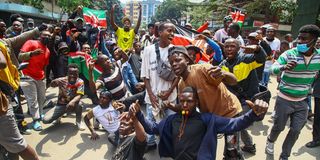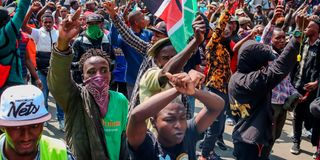
A man displays a placard with the picture of Deputy Inspector-General of Police Eliud Lagat during protests in Nairobi on June 12, 2025 to demand justice for Albert Ojwang who died in police custody.
Protesters stormed Parliament in a historic act of defiance just past 2pm on June 25, 2024.
Security officers responded by opening fire as MPs scampered for safety on a day of chaos that shook President William Ruto’s administration to the core.
Scores of protesters were injured while at least five others were killed. Part of Parliament building was set ablaze, with hundreds of youthful protesters accessing the two chambers of the National Assembly and Senate and leaving a trail of destruction.
Under the banners “Occupy Parliament” and “Reject Finance Bill”, the unprecedented June 2024 youth-led uprising radically altered the country’s social fabric and the space of politicians in organising protests.

Protesters march along Kenyatta Avenue in Nairobi during anti-Finance Bill demos on June 25, 2024.
It could also largely influence the 2027 General Election.
Armed only with digital tools, young people in Kenya have scrutinised national budget documents, government expenditure and the lifestyles of those in power to a great heights while occasionally triggering outrage against poor leadership and misuse of public resources.
The Church has also been targeted for allowing politicians and influential individuals to preach their policies from the pulpit or “donate” astronomical amounts of money in fundraisers.
The outrage against the religious leaders has since pushed some mainstream churches to reject donations and deny politicians a platform to address congregants.
Political movement
Born between 1996 and 2012, this cohort of Kenyans is emerging not just as a voting bloc, but a cultural and political movement.
According to the 2019 Kenya National Bureau of Statistics census, the youth constitute more than 75 per cent of the country’s 47.6 million people.
These are Kenyans under the age of 35.
Those aged 18 to 34 stood at 13.7 million at that time – roughly 29 per cent of the national population.
Independent Electoral and Boundaries Commission (IEBC) documents show there were 22,120,458 registered voters in 2022.
Those aged 18 to 34 were 7.7 million or 39.84 per cent of the registered voters.
Then-Deputy President William Ruto won the presidential contest with 7,176,141 votes against Azimio la Umoja One Kenya Coalition candidate Raila Odinga’s 6,942,930.
Young people alone were enough to propel a candidate to State House.
Prof David Monda, a US-based university lecturer and political analyst, says young Kenyans are a potent force that can push for socio-political change.
He, however, adds that they need to have formal institutional networks in the political system to negotiate for power.
“If not, they may end up with endless sloganeering, which, over time, the public gets tired of,” Prof Monda says.
“Young people can easily become cooped and corrupted by the establishment to betray the ideals of the Gen Z movement. The ideals are around good governance, fair taxation, ending abductions and abuse of human rights, transparency and accountability of government.”
The wave of consciousness by the youth has forced politicians to tone down on their insensitive display of flashy lifestyles. Young Kenyans have repeatedly cited the largesse and opulence of the political class as one of their reasons for demanding a lean national budget.
“To see our young people being handled the way they have been handled is extremely worrying. It needs to be noted that 80 per cent of Kenya’s population is under 40,” former Chief Justice David Maraga said in a recent NTV interview.
“The minority, who are above 40, do not want to realise that it is time we get the young people to be involved in the leadership of the country.”
Street demonstrations
The 74-year-old has declared interest in the presidency.
Street demonstrations have largely been organised around political formations in the past. For long, most of the anti-government protests were called and organised by Mr Odinga.
Some of the protests were around the “rigging” of presidential elections while others were to push for good governance and electoral reforms.
Successive regimes were, however, quick to divide the public by labelling the organisers of the protests as bitter politicians who were not ready to accept the outcome of elections.
In some instances, those in power were able to strike deals with key opposition leaders, especially Mr Odinga.
“Young people are fully aware of their rights under the Constitution and should never be ignored. They are ready to challenge authorities on the basis of accountability for leadership and governance,” says former Attorney General and Speaker of the National Assembly Justin Muturi.

Youthful demonstrators match along Kimathi Street, Nairobi during the anti-government protests on July 23, 2024.
Mr Muturi, who served in the Cabinet at the height of the uprising as the country’s AG, said those in power have not addressed issues being raised by young Kenyans.
Mr Muturi and other members of President Ruto’s first Cabinet became casualties of the Gen Z protests. He shifted from the AG’s chamber to serve as the Cabinet Secretary for Public Service.
He eventually fell out with the President over what he called state-sponsored abductions of young Kenyans. His son was among those abducted in connection with the demonstrations.
Looting of public resources
“Unfortunately, the leadership is only keen on PR when it comes to addressing pertinent issues facing the country. They think the Constitution is an impediment to their brazen and wanton looting of public resources. I advise the youth to continue being vigilant and ready to take over leadership in Kenya,” Mr Muturi says.
The place of the economy, taxation and public debt in public discourse is what experts in various fields say was the beginning of a renaissance at the level – or higher – of the independence struggle and the second liberation movement that ushered in multi-partism and the 2010 Constitution.
Machakos Deputy Governor, Francis Mwangangi, says some individuals in positions of power appear not to have learnt from the June 2024 uprising.
He warns the ruling class against ignoring the demands of young Kenyans.
“The ruling class appears to have not learnt much from the events of that time. When people say they cannot hand over power, do they even listen to themselves?” asks Mr Mwangangi, referring Dr Ruto’s recent remarks that he cannot leave the presidency to a “disorganised” opposition.
“It is important that the youth are involved in decision-making at county and national level as they have realised that the policies and decisions affect them.”
The deputy county boss says the 2027 General Election will largely be influenced by the young generation that he describes as politically active more than ever.
“This is a group of well-educated people and is using the digital space to engage and carry out public awareness,” Mr Mwangangi says.
“With the digital tools and the quick sharing of information, young Kenyans will have a major bearing on how leaders will be elected in 2027.”
Kitui Senator, Enoch Wambua says from the June 2024 protests, it was clear that Gen Zs have realised bad leadership robs them of their present and future livelihoods.
He describes their determination to fight for responsive and responsible leadership as heart-warming.
“The young people made specific demands from the government. Unfortunately, the President responded by taking actions meant to establish a shield around his government,” Senator Wambua says.
“Gen Zs never sought a deal between the government and the opposition so only the President knows what he was doing by establishing his broad-based arrangement.”
Master of double speak
He says the President has distinguished himself as a master of double speak as he promises austerity measures, including a lean administration, but appoints advisers “in every twist and turn”, adding that killing peaceful protesters continues with abandon.
“Young people must not give up the struggle for good governance. They owe it to their destiny to obtain identity cards, register as voters and ensure they fully participate in the elections,” he says.
“They must vote for people with track records of exemplary leadership and not those who dole out cash in the campaign period.”
Hardly anyone could predict that 2024 would be the year of accountability in the political space, sometimes using methods that could be considered unorthodox. Through legal means and others ways authorities say border on harassment, mobile phone numbers of those in power are shared on social media platforms and leaders are being booed, with online tools being created to hold those in authority to account.
Mr Javas Bigambo, a governance expert, says the primary lesson from the protests last year is that young people have latent power and unimaginable drive that can drastically change the course of things in Kenya.

Anti-government protesters march along Moi Avenue in Nairobi on July 23, 2024.
He says the Gen Zs will have historical influence in the 2027 General Election and those to follow.
“Leaders need to harness the youth power and not ignore it as has been the case in the past. The creativity, power and mobilisation ability of the young Kenyans will embarrass some leaders during elections,” Mr Bigambo says, adding that the potency of their power and influence can no longer be ignored.
Prof Monda says some of the demands by the youth have received lip service from the ruling class.
“The entrenched elite in the government and opposition are wary of losing their positions of privilege and patronage in a new dispensation. We still witness extra-judicial killings, abductions, corruption and coercion of the opposition,” he says.
“Gen Zs have to balance their ideals with the realities of 2025. A broad-based coalition of leaders working in an alliance of youth-led political parties with grassroots nomination and campaigns for office is the way to go.”
@ke.nationmedia.com







